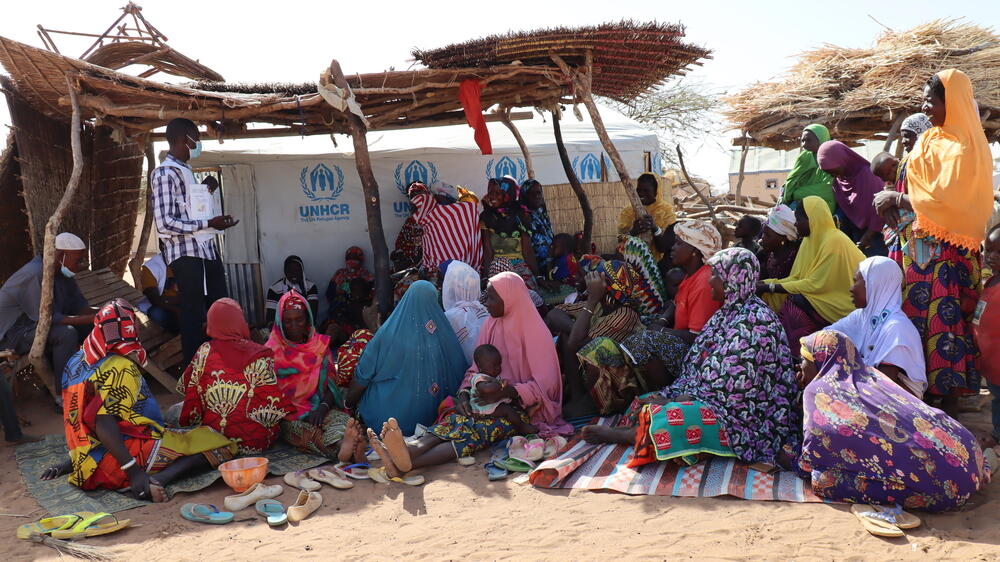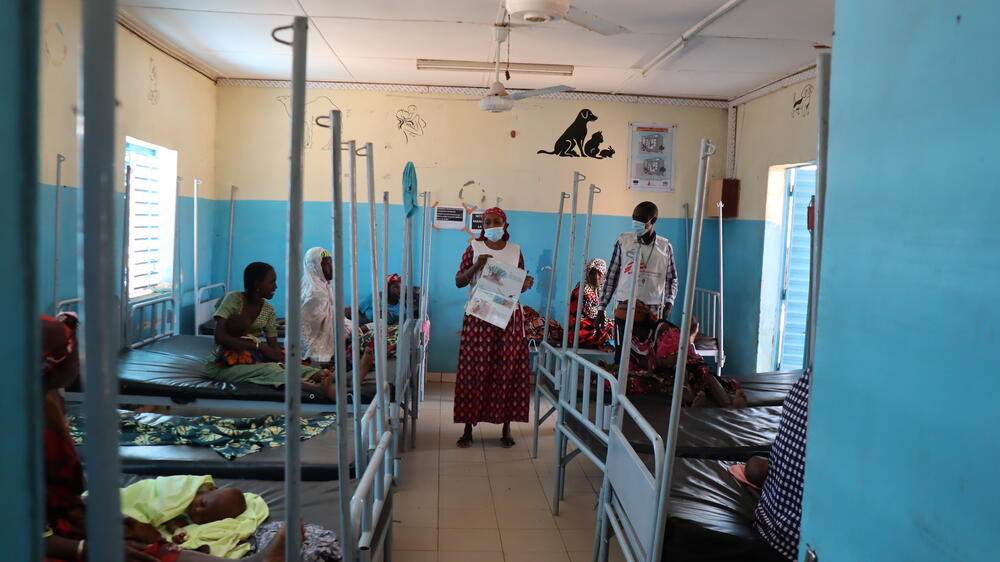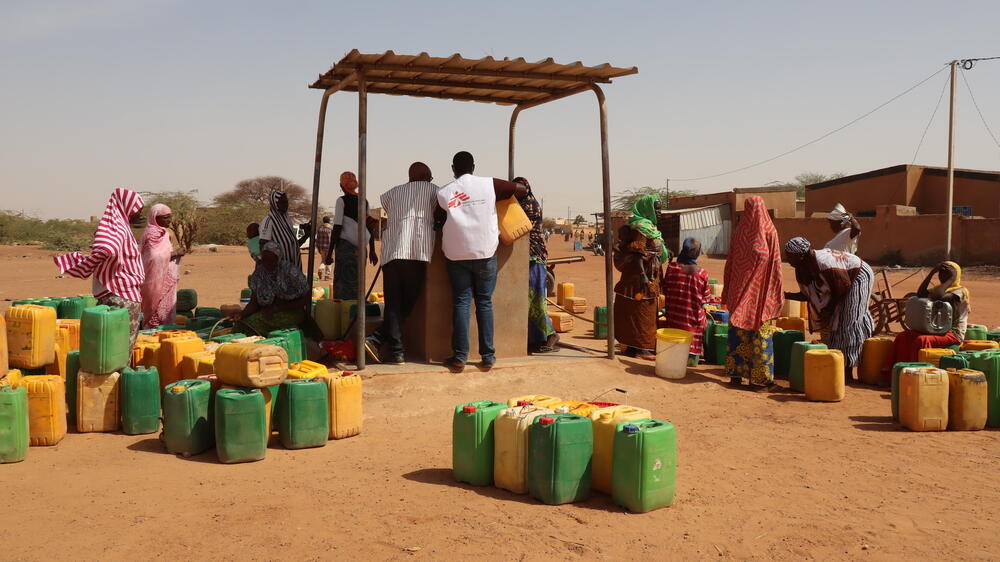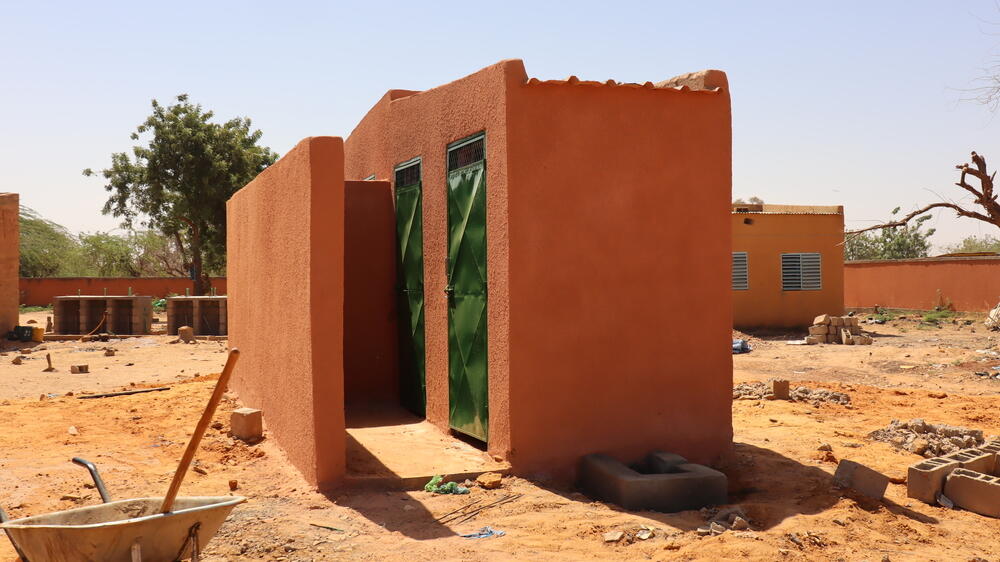Burkina Faso: The water crisis happening between conflict and climate change
Since 2018, Burkina Faso’s northern desert region of Sahel – the driest and hottest part of the country – has been at the centre of a growing armed conflict.
The violence, coupled with the impact of the climate emergency, has left communities here highly vulnerable – without water, at risk of disease and in need of urgent humanitarian assistance.
The water point
Aïssé Ouedraogo arrived at the water point, a few kilometres from her home, at four in the morning.
Six hours later, she has barely filled 10 jerry cans with clean water, each of them holding just 20 litres.
“I can't take more than that," says Aïssé.
"There is not enough water in this region, and if I take more than I need, the others will not have enough water."
Aïssé fled to this area because of violence in her village of Boulékessi, 53 miles away. At this water point in the district of Gorom Gorom, dozens of women like Aïssé now wait each day for their turn to collect clean water.
The displaced people living here rely on the water point for needs such as cooking and cleaning. However, the long wait and the distance to travel is a major difficulty for people.
"We receive hundreds of patients each month in the health centres that we support because of diseases that are the result of poor water quality”
"If we can't find water, we have to buy it and one jerry can cost 100 FCFA (£0.13),” says Aïssé.
“Sometimes we don't have a choice and it is very difficult for us."
Displaced people don’t have regular access to work and, when they do, they work as daily labourers earning very little money.
A worsening humanitarian crisis
Since 2018, Burkina Faso’s Sahel region has been plagued by continuous violence between various armed groups, the Burkinese armed forces, and between the groups themselves.
This has created a serious humanitarian crisis, with large-scale displacements of people as well as the arrival of refugees from neighbouring Niger and Mali.
Over 350,000 people are currently displaced in the Sahel region, around a third of the region's total population, and 628,000 people are in need of assistance for water, hygiene and sanitation.
In the areas with ongoing violence and those hosting displaced people, access to basic services is a big challenge and the health risks are enormous.
The climate emergency
Before the conflict began, the region had already experienced the potential impact of climate breakdown, putting pressure on its limited water resources.
According to the UN Water, Hygiene and Sanitation group, around 92,000 people are in need of assistance in the Gorom Gorom district, alone.
Guènèba Hamidou also arrived at the same water point early in the morning. Also from Boulékéssi, she fled her village in 2019 following deadly attacks.
“Life is not at all easy here. Since we arrived to Gorom Gorom, the water problem has worsened,” says Guènèba.
“Food and water are insufficient and it is difficult to get them. On the days when I go home with empty jerry cans, I have nothing to use for cooking.”
A driver of disease
During the rainy season, which begins in June, access to water becomes easier. However, using this water for cooking or drinking comes with its own dangers.

Help us prepare for the next emergency
The lack of clean water and the high concentration of people are the sources of several parasitic infections, skin diseases and water-borne diseases, such as diarrhoea.
Responding to this, providing safe water and functioning sanitation is a fundamental part of the work of Médecins Sans Frontières / Doctors Without Borders (MSF) in Burkina Faso.
"We receive hundreds of patients each month in the health centres that we support because of diseases that are the result of poor water quality," says David Munganga, MSF’s medical coordinator.
Between January and March 2021, MSF saw more than 1,200 children aged five and under suffering from diarrhoea, just in its Dori and Gorom Gorom clinics.
6
OF BURKINA FASO'S 13 REGIONS ARE AFFECTED BY THE WATER CRISIS
133,934,000
LITRES OF WATER DELIVERED BY MSF TEAMS IN BURKINA FASO IN 2020
(The equivalent of 45 Olympic-sized swimming pools)
478,000
MEDICAL CONSULTATIONS CARRIED OUT BY MSF IN BURKINA FASO IN 2020
Tackling the water crisis
In Gorom Gorom district, MSF teams recently built a new borehole to increase access to clean water on a site that serves more than 20,000 displaced people. This borehole can provide 1,100 litres of water per hour and complements seven other boreholes that the teams have repaired in the area.
Elsewhere, MSF supports the Gorom Gorom district hospital and two other health centres. Our teams also distribute hygiene kits to newly displaced people, including soap, jerry cans and water disinfection tablets. Health promoters regularly visit displaced communities to provide education and raise awareness about health and hygiene-related issues.
“Access to water and basic services for displaced people and local communities in the Sahel region, and in many places in Burkina Faso, is a real challenge,” says Youssouf Aly Dembélé, who oversees MSF’s work in Burkina Faso.
"A greater presence of humanitarian organisations is necessary to meet the growing medical and humanitarian needs of a population heavily affected by conflict."
Why does the climate emergency matter to MSF?
The human cost of climate breakdown is already being paid for by the poorest and most marginalised people on our planet.
Meanwhile, our teams around the world are responding to multiple types of healthcare emergency that will only increase in number and severity as the climate continues to destabilise.
It's clear, we owe it to our patients and staff to help find solutions to the environmental challenges we face.



